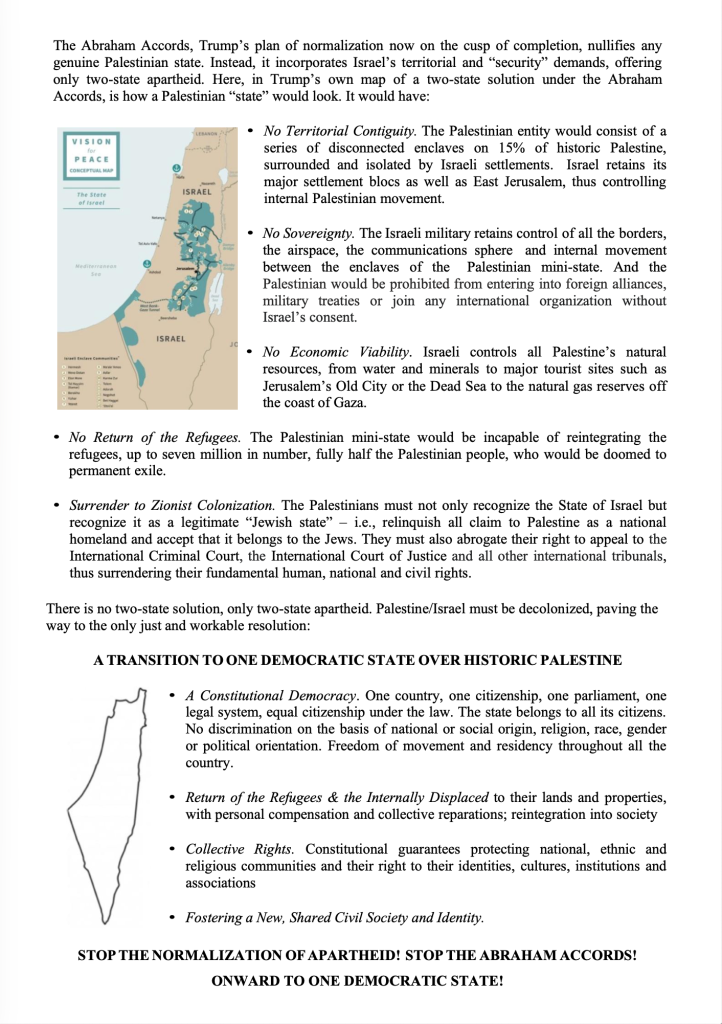
This two-page summary, prepared by ICAHD and Jeff Halper, sums up concisely where we are in the political moment in the struggle for a decolonized and free Palestine, which we hope you will consider and share.
As the page shows, we are in a confused but crucial moment between two initiatives that are coming down the pipeline and are being integrated — Trump/Netanyahu’s plan of normalization with the European/Saudi need for a Palestinian state (what I call a “good enough” Palestinian state, a Bantustan) — and the still embryonic, perhaps fantastical one-state idea, which, for all its far-fetchedness, is truly the only just and workable way out. So the page is a kind of combined reality-check of where we are politically and a warning that we are in the danger of being overtaken by events. Normalization is a closure. It is imposed by the US, Israel and the Arab states (plus other Muslim countries like Indonesia, Pakistan and Kazakhstan), not negotiated, and the Palestinians have little if any say. And after normalization, little space exists for furthering political struggle.

We may say, OK, let’s go with the flow. Apartheid is inevitable. Palestinian civil society and all of us, supporters of the Palestinians in their struggle for liberation, is simply not able to make its voice heard, fragmented and so harshly repressed as it is by both Israel and the Palestinian Authority. And so the Palestinians have no end-game of their own, the one-state idea far from being agreed-upon and formulated into a political program around which their supporters can be mobilized. When the Abraham Accords are imposed and apartheid becomes a reality, then, we can simply shift to an anti-apartheid struggle a la the ANC in South Africa. The Palestinians will then, with no choice, have the same end-game: decolonization (but more complete than what was done in South Africa) leading to a democracy based on one person, one vote.
There is a fatal flaw in this (sort of) strategy, however. While the international community refused to recognize the Bantustans in South Africa and finally rejected the apartheid regime, in the case of the Palestinians and Israel it will accept a Palestinian Bantustan as part of a “two-state solution” if only to wash its hands of this persky nuisance and move on to more weighty issues, like consolidating the rising Israeli/Saudi hegemony over the region as a NATO counterweight to China. Accepting and normalizing Israeli apartheid is a small price to pay. Good enough.
All this is to question whether a post-normalization strategy in fact exists; indeed, whether any political space exists after normalization, since normalization is, well, normalization. it’s done, it’s a closure, the international community has moved on. If we don’t try (and succeed) to block the vehicle of normalization, the impending Abraham Accords, I really wonder whether we have run out of political space for further struggle. Will the Palestinian people, despite the fervent support they enjoy from the peoples of the world, be able to continue their struggle, first and foremost against the very collaborationist Bantustan government the Abraham Accords will establish?
There is an urgency here. The Palestinian struggle is in danger of being overtaken by events. We do not determine the political timetable. Palestinian agency as expressed in the BDS movement, in film and literature, in sumud and resistance on the ground, in rallies and protests abroad must, in the end — and urgently — be accompanied by a political program, an end-game, with which to push back against the normalization of Israeli apartheid and effectively mobilize the global forces that played such a key role in defeating apartheid in South Africa.
This ICAHD page attempts to focus on the political moment we are in and the immediate threat normalization poses. Indeed, we argue that normalization represents the greatest threat to the Palestinian people since the Nakba. It also points to where, in our view and that of our Palestinian partners, the struggle should be going. A useful appraisal of the political moment, I hope, but an urgent warning as well. Please circulate.
Download a Pdf version of this ICAHD resource
